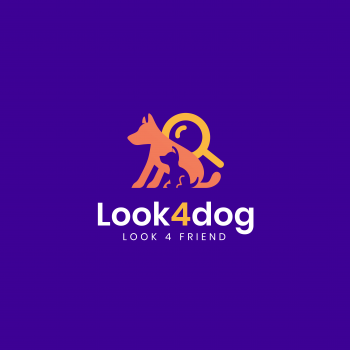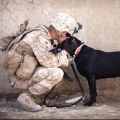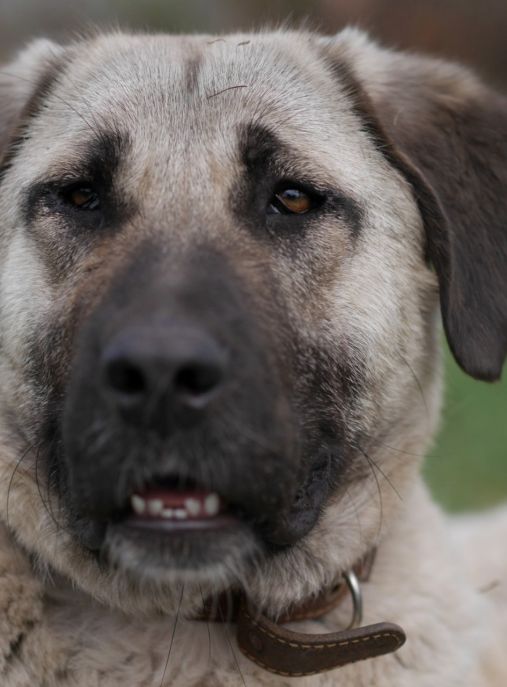The Kangal Shepherd Dog, also known as the Anatolian Shepherd Dog, is a magnificent breed that hails from the rugged region of Anatolia in Turkey. This breed is renowned for its exceptional guarding abilities, loyalty, and intelligence. With its imposing size and powerful build, the Kangal Shepherd Dog is a formidable protector and a cherished companion.
The history of the Kangal Shepherd Dog can be traced back thousands of years. These dogs were originally bred by the nomadic shepherds of Anatolia to protect their livestock from predators such as wolves and bears. The breed's origins can be traced to ancient Mesopotamia, where they were highly valued for their protective instincts and ability to thrive in harsh environments.
According to the FCI (Fédération Cynologique Internationale) typology, the Kangal Shepherd Dog belongs to Group 2, Section 2.2, which includes Molossoid breeds. These breeds are characterized by their large size, muscular build, and strong protective instincts. The Kangal Shepherd Dog is also recognized by various kennel clubs, including the American Kennel Club (AKC) and the United Kennel Club (UKC).
These dogs are primarily bred for their guarding abilities and are commonly used to protect livestock, particularly sheep and goats. The Kangal Shepherd Dog's natural instinct to protect and guard makes it an excellent choice for farmers and ranchers who need a reliable and trustworthy guardian for their herds. Additionally, their calm and gentle nature also makes them wonderful family pets.
In terms of physical characteristics, the Kangal Shepherd Dog is a large and powerful breed. Males typically weigh between 110 to 145 pounds (50 to 66 kilograms), while females weigh slightly less, ranging from 90 to 120 pounds (41 to 54 kilograms). Their height at the shoulder ranges from 28 to 32 inches (71 to 81 centimeters) for males and 26 to 30 inches (66 to 76 centimeters) for females.
The Kangal Shepherd Dog has a distinctive appearance with a broad head, strong jaws, and a muscular neck. Their eyes are dark and almond-shaped, exuding an intelligent and alert expression. The breed's ears are medium-sized and set high on the head, often folded down. Their coat is dense and double-layered, providing protection against the harsh Anatolian climate. The coat color can vary, but the most common coloration is a pale fawn with a black mask.
One of the most fascinating aspects of the Kangal Shepherd Dog is its incredible lifespan. On average, these dogs live between 12 to 15 years, which is quite impressive for a large breed. This longevity can be attributed to their robust health and the careful breeding practices employed by responsible breeders.
Apart from their physical attributes, the Kangal Shepherd Dog possesses several interesting traits. They are known for their unwavering loyalty and devotion to their families, making them excellent companions and protectors. Despite their imposing size, they are gentle and patient with children, often assuming a nurturing role within the family.
Another remarkable characteristic of the Kangal Shepherd Dog is its intelligence. These dogs are highly trainable and possess a keen ability to assess situations and make independent decisions. However, their independent nature can sometimes make training a challenge, requiring a patient and consistent approach.
It is important to note that the Kangal Shepherd Dog is not suitable for every owner. Due to their protective instincts and size, they require experienced and responsible owners who can provide them with proper socialization, training, and a secure environment. Additionally, their exercise needs should not be overlooked, as they require regular physical activity to maintain their physical and mental well-being.
In conclusion, the Kangal Shepherd Dog is a remarkable breed with a rich history and exceptional qualities. Their role as guardians and protectors has been ingrained in their DNA for centuries, making them an invaluable asset to farmers and families alike. With their imposing presence, unwavering loyalty, and intelligence, the Kangal Shepherd Dog continues to captivate the hearts of dog enthusiasts worldwide.
The Kangal Shepherd Dog, also known as the Anatolian Shepherd Dog, is a remarkable breed with a rich history and a unique character. These dogs are known for their loyalty, intelligence, and protective nature, making them excellent guardians and companions. In this text, we will delve into the character of Kangal Shepherd Dogs, their behavior, and how to raise and train them effectively.
One of the defining traits of Kangal Shepherd Dogs is their unwavering loyalty. They form strong bonds with their families and will go to great lengths to protect them. This loyalty extends not only to their human family members but also to other animals they consider part of their pack. They are known to be gentle and patient with children, making them an ideal choice for families.
In terms of behavior, Kangal Shepherd Dogs are calm, confident, and independent. They have a strong instinct to protect their territory and loved ones, which can make them wary of strangers. Early socialization is crucial to ensure they develop into well-rounded dogs who can distinguish between friend and foe. Proper socialization will also help them become more accepting of other animals and unfamiliar situations.
Training a Kangal Shepherd Dog requires patience, consistency, and a firm yet gentle approach. These dogs are intelligent and eager to please, but they also have a strong independent streak. Positive reinforcement methods, such as treats, praise, and play, work best with this breed. Harsh training methods or physical punishment can be counterproductive and may damage the trust between the dog and its owner.
Due to their protective nature, Kangal Shepherd Dogs require a confident and experienced owner who can establish themselves as the pack leader. They need clear boundaries and consistent rules to follow. Early obedience training is essential to ensure they understand basic commands and develop good manners. It is also important to provide mental stimulation through puzzle toys, interactive games, and regular exercise to prevent boredom and destructive behavior.
When it comes to exercise, Kangal Shepherd Dogs are moderate to high-energy dogs. They require daily physical activity to keep them mentally and physically stimulated. Long walks, jogs, or hikes are ideal for meeting their exercise needs. However, it is important to note that they have a tendency to roam, so it is crucial to provide a securely fenced yard or keep them on a leash during walks.
In conclusion, Kangal Shepherd Dogs are loyal, intelligent, and protective companions. They require a confident and experienced owner who can provide them with proper socialization, training, and exercise. With the right guidance and care, these dogs can thrive and become loving members of the family while fulfilling their natural instincts as guardians.
The Kangal Shepherd Dog, also known as the Anatolian Shepherd Dog, is a magnificent breed known for its loyalty, intelligence, and protective nature. Caring for these dogs requires a deep understanding of their unique needs and characteristics. In this text, we will provide you with an extensive description of the recommended care for Kangal Shepherd Dogs, along with some valuable tips on what to do and what not to do.
1. Exercise and Mental Stimulation:
Kangal Shepherd Dogs are active and energetic animals that require regular exercise to maintain their physical and mental well-being. Daily walks, runs, or play sessions in a secure area are essential to keep them happy and healthy. Engaging them in mentally stimulating activities like puzzle toys or obedience training will also help prevent boredom and destructive behavior.
2. Proper Diet and Nutrition:
Providing a balanced and nutritious diet is crucial for the overall health of your Kangal Shepherd Dog. Consult with a veterinarian to determine the appropriate amount and type of food for your dog's age, size, and activity level. Avoid overfeeding, as this breed is prone to obesity. Additionally, ensure a constant supply of fresh water is available at all times.
3. Grooming and Coat Care:
Kangal Shepherd Dogs have a dense double coat that requires regular grooming to keep it in optimal condition. Brush their coat at least once a week to remove loose hair and prevent matting. During shedding seasons, daily brushing may be necessary. Bathing should be done only when necessary, using a mild dog shampoo to avoid skin irritation. Regularly check their ears, teeth, and nails for any signs of infection or overgrowth.
4. Socialization and Training:
Early socialization is crucial for Kangal Shepherd Dogs to develop into well-rounded and confident adults. Expose them to various people, animals, and environments from a young age to help them become comfortable and adaptable. Consistent and positive reinforcement-based training is essential to establish boundaries, obedience, and good behavior. These dogs are intelligent and eager to please, making them highly trainable.
5. Secure Fencing and Supervision:
Kangal Shepherd Dogs are natural protectors and have a strong instinct to guard their territory. It is crucial to provide them with a secure and sturdy fence to prevent them from wandering off or engaging in territorial disputes with other animals. Supervise them during outdoor activities to ensure their safety and prevent any potential conflicts.
6. Health Care and Regular Vet Check-ups:
Regular veterinary check-ups are essential to monitor your Kangal Shepherd Dog's overall health and address any potential issues promptly. Vaccinations, parasite prevention, and routine examinations should be part of their healthcare regimen. This breed is generally healthy, but they may be prone to certain conditions like hip dysplasia, bloat, and eye problems. Regular exercise, a balanced diet, and maintaining a healthy weight can help minimize the risk of these health issues.
What Not to Do:
1. Do not leave your Kangal Shepherd Dog alone for extended periods. They thrive on human companionship and may develop separation anxiety if left alone for too long.
2. Do not use harsh training methods or punishment-based techniques. These dogs respond best to positive reinforcement and gentle guidance.
3. Do not neglect their exercise needs. Lack of physical activity can lead to obesity, behavioral problems, and overall dissatisfaction.
4. Do not allow your Kangal Shepherd Dog to roam freely without supervision. Their protective nature may lead to conflicts with other animals or people.
5. Do not skip regular vet check-ups or neglect their healthcare needs. Prevention and early detection are key to maintaining their well-being.
In conclusion, caring for a Kangal Shepherd Dog requires dedication, patience, and a deep understanding of their unique needs. By providing them with proper exercise, nutrition, grooming, socialization, and healthcare, you can ensure they lead a happy and fulfilling life as a beloved member of your family.
The Kangal Shepherd Dog, also known as the Anatolian Shepherd Dog, is a magnificent breed that possesses a distinct and captivating coat color. These dogs are renowned for their exceptional guarding abilities and their striking appearance, which is enhanced by their unique coat coloration.
The common color of Kangal Shepherd Dogs is a rich and lustrous fawn, which is often described as a warm and earthy hue. This color is predominantly seen in the breed and is a defining characteristic of these magnificent canines. The fawn coloration can vary in intensity, ranging from a lighter, sandy shade to a deeper, reddish-brown tone.
The coat of the Kangal Shepherd Dog is dense, thick, and weather-resistant, providing them with protection against harsh climates and predators. The fawn color is evenly distributed throughout their body, including their back, sides, and limbs. The coat is often slightly longer around the neck, forming a majestic mane that adds to their regal appearance.
One of the most captivating aspects of the Kangal Shepherd Dog's coat is the presence of a black mask. This mask covers the muzzle and extends to the eyes, giving them an intense and alert expression. The black mask beautifully contrasts with the fawn color, highlighting their facial features and adding to their overall allure.
In addition to the fawn color and black mask, Kangal Shepherd Dogs may also exhibit white markings on their chest, paws, and tail tip. These white patches add a touch of elegance to their appearance, creating a striking contrast against the warm fawn color.
The fawn coat color of Kangal Shepherd Dogs not only contributes to their aesthetic appeal but also serves a practical purpose. The natural camouflage provided by their coat allows them to blend seamlessly with their surroundings, making them excellent guardians and protectors of their flocks. This coloration helps them to remain inconspicuous while keeping a watchful eye over their charges.
It is important to note that while the fawn color is the most common, Kangal Shepherd Dogs can also exhibit other coat colors, such as brindle or solid white. However, these variations are less prevalent and do not define the breed as strongly as the fawn color does.
In conclusion, the Kangal Shepherd Dog is renowned for its captivating fawn coat color, which is the most common and defining characteristic of the breed. The warm and earthy hue, complemented by the striking black mask and occasional white markings, creates a visually stunning appearance. This coat color not only adds to their regal and majestic presence but also serves a practical purpose in their role as guardians and protectors.
The Kangal Shepherd Dog, also known as the Anatolian Shepherd Dog, is a large and powerful breed originating from Turkey. These dogs have been primarily bred for their exceptional guarding and herding abilities, making them highly valued working dogs. In terms of health, Kangal Shepherd Dogs are generally robust and resilient, but like any breed, they can be prone to certain health issues.
One of the most common health concerns in Kangal Shepherd Dogs is hip dysplasia. This condition occurs when the hip joint doesn't develop properly, leading to instability and eventually arthritis. Responsible breeders perform hip evaluations on their breeding dogs to minimize the risk of passing on this condition. Regular exercise, a balanced diet, and maintaining a healthy weight can help reduce the impact of hip dysplasia.
Another prevalent health issue in this breed is entropion, a condition where the eyelids roll inward, causing the eyelashes to rub against the cornea. This can lead to irritation, corneal ulcers, and even vision loss if left untreated. Regular eye examinations by a veterinarian are crucial to detect and address entropion early on. Surgical correction may be necessary in severe cases.
Kangal Shepherd Dogs are also prone to certain skin conditions, including allergies and demodectic mange. Allergies can manifest as itching, redness, and recurrent ear infections. Identifying and avoiding potential allergens, such as certain foods or environmental triggers, can help manage these allergies. Demodectic mange, caused by mites, can result in hair loss, itching, and skin infections. Treatment typically involves medicated baths and medications prescribed by a veterinarian.
Gastric dilatation-volvulus (GDV), commonly known as bloat, is a life-threatening condition that can affect Kangal Shepherd Dogs. It occurs when the stomach fills with gas and twists, cutting off blood supply. This can lead to shock and death if not treated promptly. Feeding multiple small meals throughout the day, avoiding exercise immediately after meals, and using elevated feeding bowls can help reduce the risk of bloat.
To ensure the overall health and well-being of Kangal Shepherd Dogs, regular veterinary check-ups are essential. Vaccinations, parasite prevention, and dental care should be part of their routine healthcare. Additionally, providing a balanced and nutritious diet, appropriate exercise, and mental stimulation are crucial for their physical and mental health.
Exercise is particularly important for this breed, as they have a strong working instinct. Daily walks, playtime, and opportunities to engage in activities that stimulate their natural instincts, such as herding or obedience training, are beneficial. Mental stimulation can be achieved through puzzle toys, obedience training, and interactive play.
Proper grooming is also necessary to maintain the health of Kangal Shepherd Dogs. Regular brushing helps remove loose hair and prevents matting. Their ears should be checked regularly for signs of infection, and their nails should be trimmed as needed. Dental hygiene is crucial, and regular brushing or providing dental chews can help prevent dental diseases.
In conclusion, Kangal Shepherd Dogs are generally healthy and robust, but like any breed, they can be prone to certain health issues. Responsible breeding practices, regular veterinary care, a balanced diet, appropriate exercise, and proper grooming are essential for maintaining their overall health and well-being. By providing them with the care they need, Kangal Shepherd Dogs can lead long, happy, and healthy lives.
The Kangal Shepherd Dog, also known as the Anatolian Shepherd Dog, is a large and powerful breed originating from Turkey. These dogs have been traditionally used as livestock guardians, and their nutrition plays a crucial role in maintaining their health, strength, and overall well-being. To ensure optimal nutrition for Kangal Shepherd Dogs, it is important to consider their dietary requirements, feeding schedule, and potential food sensitivities.
Protein is a vital component of a Kangal Shepherd Dog's diet as it supports muscle development and repair. High-quality animal-based proteins such as chicken, beef, lamb, and fish should form the foundation of their meals. These proteins should be lean and free from excessive fat, as Kangal Shepherd Dogs are prone to weight gain if overfed. It is recommended to provide them with a protein content of around 25-30% in their daily diet.
In addition to protein, Kangal Shepherd Dogs require a balanced intake of fats and carbohydrates. Healthy fats, such as those found in fish oil or flaxseed oil, contribute to their skin and coat health, as well as providing a source of energy. Complex carbohydrates, like brown rice or sweet potatoes, are preferable over simple carbohydrates to ensure sustained energy levels throughout the day.
Feeding Kangal Shepherd Dogs should be done in controlled portions to prevent obesity. It is advisable to divide their daily food intake into two or three meals, depending on their age and activity level. Puppies require more frequent meals, while adult dogs can be fed twice a day. Free-feeding or leaving food out all day is not recommended as it can lead to overeating and weight gain.
While Kangal Shepherd Dogs have a relatively robust digestive system, certain foods should be avoided to prevent potential health issues. These include foods that are toxic to dogs, such as chocolate, onions, garlic, grapes, and raisins. Additionally, foods high in sodium, artificial preservatives, and additives should be avoided as they can contribute to various health problems, including heart disease and allergies.
It is essential to provide Kangal Shepherd Dogs with fresh and clean water at all times. Hydration is crucial for their overall health, especially during hot weather or periods of increased physical activity. Regular access to water helps prevent dehydration and aids in digestion.
When it comes to treats, moderation is key. Treats should be used sparingly and should not exceed 10% of their daily caloric intake. Opt for healthy, natural treats that are specifically formulated for dogs, avoiding those high in sugar, salt, or artificial ingredients.
Lastly, it is important to monitor your Kangal Shepherd Dog's weight and body condition regularly. Adjust their food portions accordingly to maintain a healthy weight. If you notice any sudden weight loss or gain, consult with a veterinarian to rule out any underlying health issues.
In conclusion, providing a well-balanced and nutritious diet is essential for the health and longevity of Kangal Shepherd Dogs. A diet rich in high-quality proteins, healthy fats, and complex carbohydrates, along with controlled portions and regular access to fresh water, will help ensure their optimal well-being. Avoiding toxic foods and monitoring their weight will further contribute to their overall health and happiness.







